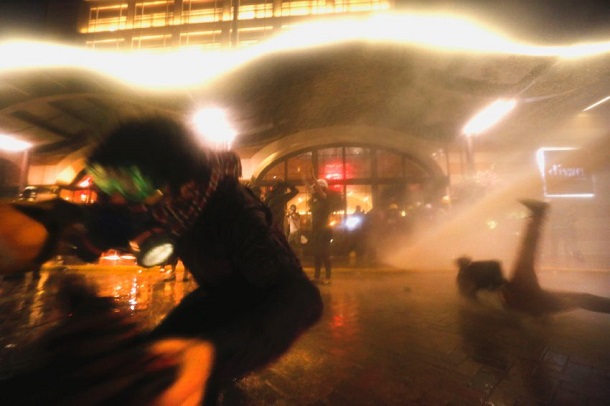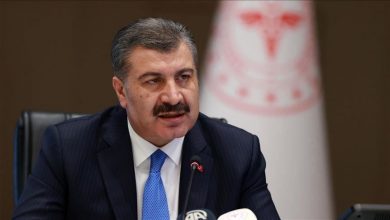Turkey Riot:Prime Minister Recep Tayyip Erdogan’s risky game / Breaking News
Prime Minister Erdogan crackdowned Taksim protests by using excessive force, but Turkey now seriously polarized country, His succes depending on the country of balanced.
The giant mosque would be the largest in Istanbul, big enough to accommodate 30,000 believers. It would be positioned on Camlica Hill, the highest point in the city a striking, incomparable and everlasting structure.
The Turkish prime minister has been dreaming of this mosque for a long time. It’s one of his favorite projects. It doesn’t have a name yet, but it’s quite possible that it will be named after Recep Tayyip Erdogan. Like his favorite sultan, Suleiman the Magnificent, Erdogan likes to describe himself as a “builder.”
Until three weeks ago, no one seemed able to hold him back, not from his construction mania, not from his egocentric approach to politics and not from his conservative ideas about educating the people.
But then something happened that struck at the core of the prime minister’s high-handedness: a youth uprising triggered by plans to demolish a deeply symbolic park. It led to comparisons between Istanbul in 2013 and Paris in 1968.
Suddenly the Gezi Park young generation is refusing to simply comply with the government’s dictates. It wants a more open society, and it no longer wishes to be patronized, neither by Islamists nor by Kemalists. Its rage is directed against both the tedious social conservatism of the ruling Justice and Development Party (AKP) and the authoritarian Turkish state and its repressive police force.
It began on May 28, when primarily young Turks demonstrated against a development plan in the heart of Istanbul, and their protests were brutally struck down by police with tear gas and water cannons. This police violence brought first hundreds, then thousands and finally hundreds of thousands of anti-government protesters into the streets. At least five people were killed and more than 5,000 injured in the nationwide unrest. Erdogan finally seemed to back down last Thursday and met with representatives of the protest movement.
But then at a rally in Ankara on Saturday, PM Erdogan said he had reached the boundaries of his patience. That night, his security forces used bulldozers to clear the protesters out of Gezi Park. They chased down fleeing demonstrators and beat them with clubs. They shot tear gas into cafes and hotels. Doctors were arrested for treating the wounded. On Sunday, Erdogan gave a heated speech describing the protesters as “terrorists.” Then, on Monday, Deputy Prime Minister Bulent Arinc told a Turkish news channel that the government might call up the army to restore order.
Turkey Unrest: A rebellion in Turkey not seen in many years
There have been periodic flare-ups of leftist protests in Turkey, especially during the turbulent 1970s. But the clashes were a great deal more violent at the time. Radical groups fought each other in the streets, leading to large numbers of casualties and prompting the military to intervene. These former Revolutionaries are the parents of some of today’s trip generation, and they support their children in their protests against Erdogan, whom they see as a despot. But are they right?
Many Turks believe that the international community has been overly impressed by Turkey’s economic growth in recent years, and by hip Istanbul, with its glittering clubs and glass towers while, at the same time, members of the opposition and Kurds have been sent to prison in large numbers, reporters have been intimidated and artists bullied.
It is clear that the AKP has taken advantage of the boom to build a state in which it wields substantial control. The people in top positions in law enforcement and the judiciary serve at Tayyip Erdogan’s pleasure, and as the reporting on the youth protests demonstrated, the government also largely controls the media. Contracts for major projects are awarded almost exclusively to pro-government developers. The lucrative new development planned for the Gezi Park site is also reportedly in the hands of a holding company in which Erdogan’s son-in-law is a board member.
It didn’t take much more than that to unleash Turkey’s May revolts, and almost everyone had a reason to take to the streets, as the composition of the protest movement shows. It is a melting pot of conservationists and leftist Muslims, football fans and young creative types, and although it is still amorphous and disorganized as movements go, its existence alone poses a challenge to the prime minister.
And Erdogan? He sees the ghosts of his old rivals, the Kemalists, at work wherever he encounters resistance. He repeatedly derided the protesters as “radical fringe groups” and “scraps,” but then he blamed the unrest on the “old elite.” This reveals how little Erdogan has comprehended the social changes taking place in his country. Officials with the Kemalist party, the CHP, tried to give speeches at the demonstrations but were drowned out by whistling protesters.
Turkey Riot: PM Erdogan’s past experiences
It’s possible to fathom the roots of the prime minister’s polarizing worldview. As the son of poor parents, Erdogan had to endure many insults. His adversaries tried to keep him down and intimidate him, and he was also thrown into prison and barred from politics.
Those adversaries were consistently members of the Kemalist class, who looked down on Erdogan, the strictly religious proletarian from Kasimpasa, a poor Istanbul neighborhood. His rise to the top echelons of politics was hard-fought. He had to learn to be aggressive and sometimes to rein himself in, but never to give up.
The clear distinction between “us” and “them” still plays a role today in Erdogan’s political campaigns. “We” are the oppressed, pious, ordinary people, while “they” are the oppressors and the decadent, often from abroad, the Europeans, the markets and the “interest rate lobby.”
In Erdogan’s three terms, there have actually been periods in which things were going well between the prime minister and his opponents. Like Erdogan, many liberals wanted more democracy and less of a military state. But then Erdogan reverted to the old patterns of control, and it became clear that the kind of democracy he envisioned was more of a “controlled democracy.” To legitimize it, he still invokes the threats posed by “them,” even though many of “them” are in prison today.
Turkey Protests: Weak opposition movements began in Erdogan’s AKP
But it remains in question how many members of his party truly value his Rambo-like approach. Cracks are beginning to appear in the conservative camp.
President Abdullah Gul, the seemingly mild-mannered president, has said some astonishing things behind the premier’s back: that the government has understood the “message” of the street and that democracy isn’t just something that exists on election day. Nevertheless, Gul has had the chance to intervene in the escalating conflict and, so far, has done nothing.
The influential Fethullah Gulen movement, which is led by Islamic scholar Fethullah Gulen and partly backed by President Gul himself, expressed its criticism more clearly. Through its mouthpiece, the daily newspaper Zaman, it accused the prime minister of having done “enormous damage” to the “national psyche.” And Fehmi Koru, a pro-government journalist, pondered the establishment of an independent Gulen party in case the differences between the “Fethullahçi” and Erdogan intensified.
For this reason, it could be owing to the Gulen movement that the prime minister jumped over his shadow and offered the protesters a referendum over the future of Gezi Park.
Erdogan doesn’t want to spoil things with the “Fethullahci,” fearing that they could work against him and prevent the man from Kasimpasa from fulfilling his lifelong dream of becoming president next year.
Under the AKP statutes, Erdogan, after serving three terms as prime minister, can no longer run as his party’s top candidate. This is precisely why he has strengthened a presidential system and introduced direct presidential elections, so that in 2014 the people will decide who becomes head of state. Erdogan wants to replace Gul.
But Gül has expressed his interest in serving another term as president. This leaves Erdogan with no option but to rewrite his own party statutes and run for prime minister a fourth time.
Erdogan has shown that he isn’t about to relinquish power anytime soon. He wants to see the day when he, as the leader of his people, dedicates the Camlica Mosque of Istanbul.
[adrotate banner=”64″]






a very good article that reflects on the fact. wish I could read some of that in turkish press so that erdogan’s supporters will understand we are not the ”kemalists” nor the supporters of that ideology..
RTE is a very dangerous man. Reminiscent of a little guy in 1930’s Germany who strutted about preaching ”his way or the prison way”
The leader of Turkey really, really made a mistake. If he would have just let the protesters be at the beginning they would have gotten bored and left. Instead he has enraged them. He can’t lead Turkey anymore.